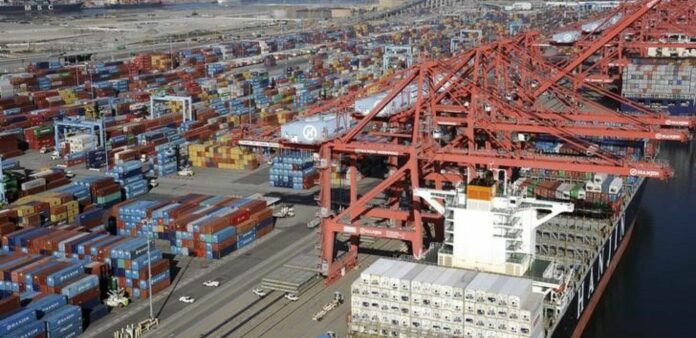[ad_1]
Agweek Podcast: West Coast port labor talks hang over strained supply chains
Fri Jul 08 05:59:34 EDT 2022
As of this week, more than 20,000 West Coast dock workers are working without a contract.
But the International Longshore & Warehouse Union (ILWU) and the Pacific Maritime Association (PMA) both say they’re committed to reaching a deal and avoiding a strike.
A strike could be a further detriment to
already backed up supply chains
. Upper Midwest crops ship out through the West Coast, and other supplies come in through the same routes.
22,000 ILWU workers are represented by the ILWU Coast Longshore Division at 29 ports on the West Coast, and the PMA represents about 70 employers.
Andrew Bower, sales director in the liquid logistics division at OEC Group, a major logistics provider, said that the conflict between the two sides comes down to the carriers making “more money than they’ve ever made” due to elevated consumer demand.
“The union is aware of this, and there are pushes for automation as well, at West Coast port facilities, which obviously from the union’s perspective, is a threat to jobs,” said Bower, who is based out of Galveston, Texas. “One of their stated goals is to ensure full employment for their members, so it’s a very tough situation.”
The PMA is comprised of executives from shipping lines and port terminal owners, said Bower, and so the side has an interest in keeping things going rather than escalating action.
“But when you’ve got over 20,000 members in a union, it’s going to be contentious when you’re standing up for your stated goals,” Bower said of the ILWU.
In mid-June, the ILWU and PMA issued a joint statement saying “neither party is preparing for a strike or a lockout”, but they were unlikely to reach a deal by the end of their current contract, which ended on July 1.
Just before the statement was released, a group of U.S. Senate Republicans wrote to President Joe Biden urging federal intervention on the labor dispute to avoid economic disruption.
Bower said it’s difficult to gauge the status of talks between the two sides as the negotiations are closed, but even if government officials step in, it will be a “very difficult” process ahead.
In 2014 and 2015, contract negotiations between the union and PMA caused major backlogs at Western ports. The work stoppages forced then-President Barack Obama’s administration to intervene in the situation. Bower said it took nine months from the intended contract renewal date to get a deal done.
“I had actually just come into the industry around that time, and it was just massive disruptions, delays,” he said. “If you carry that through to today’s market, where we see a lot more instability, you know, it’s going to be even more catastrophic.”
He said similar work stoppages today to the ones during 2014-15 would mean demand shifts in terms of which trade lanes are being requested from importers.
“You’ll see a lot more traffic booked to U.S. Gulf Coast ports, just to stay as far away from the West Coast as possible, if there is a lockout,” said Bower. “So there are numerous second and third order effects that we’re planning for, if this continues.”
Bower said the longer the negotiations take, the more opportunity there is for “disruption and chaos” in the supply chain.
Since the talks between the two sides are closed-door negotiations, Bower’s advice is to keep an “ear to the ground” with logistics providers and with truckers locally, if working with truckers on the West Coast.
“Even though there’s no formal feedback coming out of these negotiations just yet, there are a lot of whispers in the marketplace about what’s going on,” said Bower. “And everyone knows the situation with the amount of leverage that this ILWU has.”
“It remains to be seen, but I don’t have a very good feeling about it personally,” said Bower. “And we’re preparing for massive rerouting of cargo to other ports, both U.S. Gulf Coast and U.S. East Coast.”
[ad_2]
Source link







